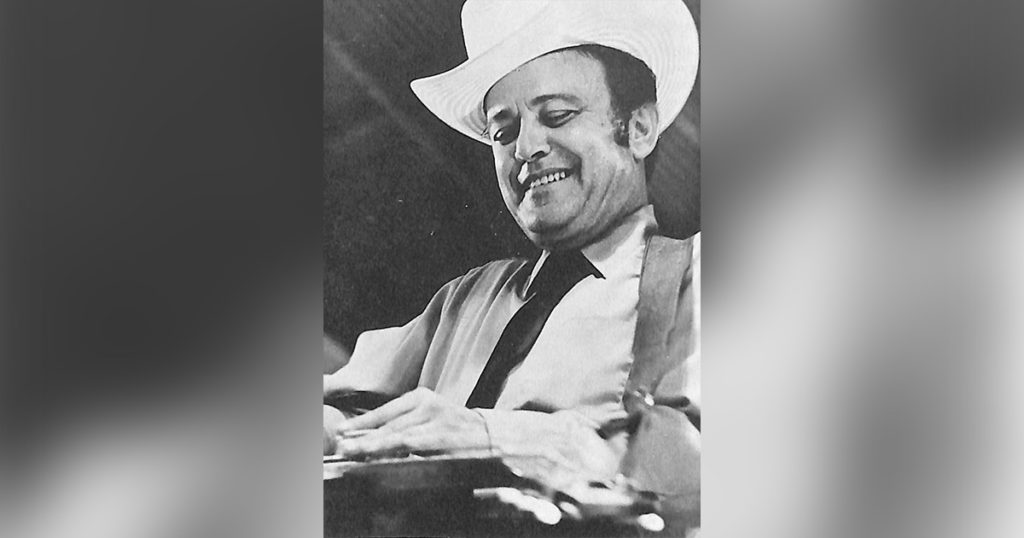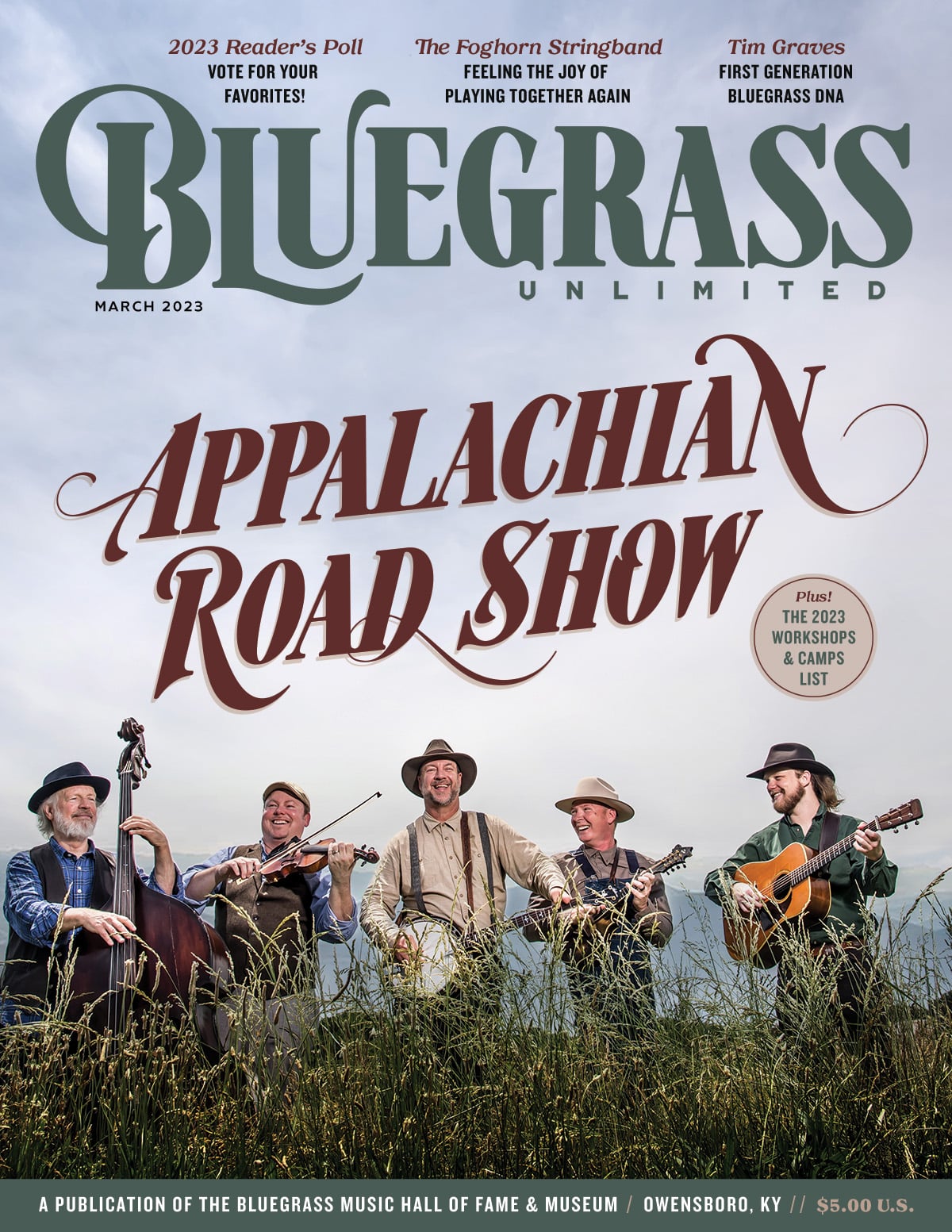Home > Articles > The Archives > Josh Graves
Josh Graves
Reprinted from Bluegrass Unlimited Magazine
December 1972, Volume 7, Number 5
The Dopera Brothers’ resophonic guitar probably has reached its greatest success in the capable hands of Josh Graves, who brought the acoustic slide guitar to Carnegie Hall for the first time when the Flatt and Scruggs organization played there in the early 1960s and who regularly dazzles college audiences across the nation with his dobro work as a member of the Earl Scruggs Revue.
The Scruggs show played San Francisco recently, and on a quiet Sunday morning after playing most of the night at a post-show party, Graves spent some time reminiscing about his childhood, early career, and later success.
Josh was born Burkett Graves in Tillico Plains, Tenn., in the mountainous eastern part of the state noted for its wild boars. His father raised corn and barley, and had one other son and two daughters.
“I had one brother who played music a little, he wasn’t professional or anything,” Josh recalled. “All my mother’s people played I guess that’s where I got it.”
“They played stringed instruments more or less for their own amusement at parties and such. All my cousins played guitar and I had an uncle that played steel guitar. I guess that inspired me more than anything. He’d let me borrow it once in a while to take it home with me.”
Graves’ first guitar of his own was an old Stella, with a nut to boost the strings up for steel playing. A “conservatory of music” moved into his town and they offered a deal that if you took sixty lessons at $1 apiece, you could keep the guitar.
“I took a few lessons then dropped out awhile,” Josh recalls. “When I went back about three months later, the place had closed up so I just kept the guitar.”
Once, when Josh was still quite young, the Carlisle Brothers, Bill and Cliff, came to town. Cliff’s Dobro may be heard on many Jimmy Rodgers records of the late ‘20s and early ‘30s.
“I had heard him on the radio,” Josh said, “but when he came to town it was really something. He played at a little school in my home town, and he took time to come and talk to me—I really remember and appreciate that. He was standing in a group of men, talking, and I just stood there and stared. He came over and talked to me, and all I could think of to say was ‘I got a guitar like yours’. Of course I didn’t, but I thought I did.”
Later when Graves moved to Nashville, he and Carlisle became friends, and Josh eventually acquired Carlisle’s old Dobro, which he now plays.
As he grew older, Josh began playing with friends he met in school, doing parties and school programs.
“We got a group together we thought was the best in the country,” he said. “It was called the Pierce Bros, and the Blount County Ramblers. We got us an 18-station hookup out of Knoxville, Tenn. In those days you could hang up a window card and pack the house you didn’t need a name. Sometimes
I wish I could call back those days … we had a lot of fun.
“I stayed with them about a year I guess. Everybody got jobs and started drifting off. I went to Knoxville and got a job with a professional group, Esco Hankins.”
Josh played with Hankins from 1943 until 1947, and from 1948 until 1950, and after that spent four years with Wilma Lee and Stoney Cooper at WWVA in Wheeling, W.Va. He left the Coopers to play with Toby Stoud and then Mac Wiseman and was in the Wiseman band in 1955 when one day the phone rang and it was Earl Scruggs.
Josh had met Earl in 1949, and Earl had shown him how the banjo rolls worked, so that Josh was able to adapt a similar style to Dobro.
“Earl asked me to come down and work with him, playing bass. They scared me, they brought me in for two weeks ‘to see if you can cut our style’. Two weeks went on into two months and they didn’t say anything. Finally one day Lester and Earl called me down to meet them in the hotel coffee shop, and they asked me if I’d rather play bass or Dobro. That was like asking a rabbit if he’d like to be thrown into a briar patch. I said, “Dobro.”
When Josh joined the Flatt and Scruggs band, the group was on a breakneck schedule of travel and work. There was a daily early morning radio show for Martha White Mills, a spot on the Grand Old Opry Saturday night, and five live television shows around the south, plus live appearances.
“Monday we’d play in Columbus, Ga.,” Josh said, “then we’d do a school house or a theater after the TV show, then go to Atlanta for a TV show and live date on Tuesday, then on Wednesday it was Florence, S.C., same deal; and from there Huntington, W.Va. and back to Jackson, Tenn., on Friday night. We’d do a show after the TV show and then back to the Opry. And sometimes we’d play a show on Sunday afternoon.
“Other than that,” he smiled, “we just messed around. I didn’t have a day off for six months when I came with Flatt and Scruggs.
In 1960 Flatt and Scruggs hitched a ride on the coattails of the folk music boom to put bluegrass on the map, nationwide. They played a network television special out of New York and Josh says, “That’s when it all started happening.”
The following year Earl Scruggs went to the Newport Folk Festival as a single, and soon Flatt and Scruggs were playing more colleges than southern schoolhouses.
When Lester and Earl separated, Josh continued to play with Flatt and the Nashville Grass, until January of 1972, when he joined the Earl Scruggs Revue.
“We’ve been hitting one nighters, colleges, some times three a week. Then the next week we might play a club,” he said.
“I like the club jobs better, they last a week at a time and there’s not all the strain of traveling. It’s so much better now that we fly everywhere we go, it takes a lot of the strain off.
Josh has been doing studio recording, when he can fit it in.
“I miss a lot that I can’t get to,” he said. “Sometimes they’ll call me and if I can’t make it and they can’t change their date I’ll say, ‘Hey, leave me a track open and maybe I can fill in later.’ “Of course my first interest is the Earl Scruggs Revue. I don’t make my living recording alone, so my first loyalty is to
Scruggs. I really enjoy playing with the kids they really make you work.
Josh has two sons in the music business. Josh Jr. plays bass in a country band and his other son performs as a singer under the name of Billy Troy.
They live in a suburb of Nashville in a house that Josh says is “quite a mess when we’re all there together.”
“Sometimes one of us is coming in at 4 a.m. and someone else is leaving. And when we all get together to play, I don’t know how my wife stands it.

